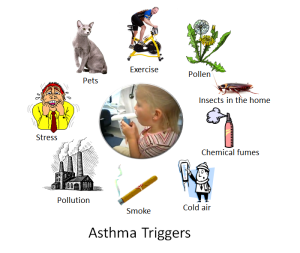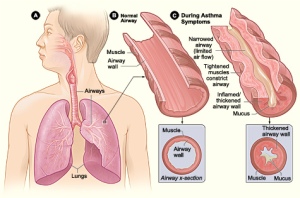Lauren’s Story
April 16, 2013Project VOICE – Building Leaders for Change in Michigan Communities
May 28, 2013May is National Asthma and Allergy Awareness Month. The Asthma and Allergy Foundation of America (AAFA) declares May as the official month for awareness because of spring, blooming trees, and gentle breezes, which spread pollen and other allergens through the air we breathe every day. Many of the same things that trigger allergy symptoms also trigger asthma symptoms, such as shortness of breath, wheezing, and chest tightness. Spring is peak season for people who live with asthma and allergies.
Asthma and allergies are serious chronic diseases affecting more than 60 million people in the United States. Both can be very serious. However, with proper management, people with asthma and allergies can lead healthy, productive lives.
Allergies occur when the immune system reacts to allergens that are:
- Inhaled (pollen, dust mites, etc.)
- Eaten (peanuts, shellfish, etc.)
- Injected (bee stings, certain medicines, etc.)
- Touched (poison ivy, latex, etc.)
Symptoms include:
- Sneezing
- Runny Nose
- Itchy Nose or Throat
- Coughing
- Skin Rashes or Hives
If you have allergies, don’t ignore them. Allergy symptoms rarely go away on their own. And there’s evidence that poorly managed allergies can lead to more severe symptoms like ear infections, sinus infections, and even asthma. So take your allergy symptoms seriously and see your doctor. Not only will regular medical treatment and lifestyle changes help end sniffling and sneezing now, but it can also protect you from more serious complications in the future
Asthma occurs when airways become blocked or narrowed due to exposure to allergens, irritants, strenuous exercise, anxiety or other triggers. If an asthma attack is severe, a person may need emergency treatment.
Symptoms include:
- Sudden Shortness of Breath
- Difficulty Breathing
- Tight Chest
- Wheezing or Coughing
 An asthma diagnosis is usually determined at a well-child visit, or at a regular check-up. Your primary care provider will check lung function and also find out about family history. If asthma is suspected, additional testing will be done to determine whether an individual has asthma. At that time, medication, and a treatment plan including an asthma action plan will be created.
An asthma diagnosis is usually determined at a well-child visit, or at a regular check-up. Your primary care provider will check lung function and also find out about family history. If asthma is suspected, additional testing will be done to determine whether an individual has asthma. At that time, medication, and a treatment plan including an asthma action plan will be created.
Enjoy the spring flowers and warm sunshine, but make sure to pay attention to any reactions you may be having to the pollen and other irritants in the air, and see your physician if you think you may be suffering from allergies or asthma to get proper treatment.



